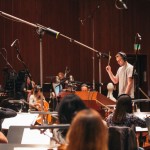For some time now I have been meaning to write about the soundtrack to Titan Souls. The music was composed by David Fenn, who has also composed the music for the mobile game Telepaint! and the platformer Leaf Me Alone. If you’re not familiar with Titan Souls, it is a challenging game where the player must battle numerous large bosses armed solely with a bow and arrow while trying to avoid a one hit sudden death.
Visually it reminded me of The Legend of Zelda and Shadow of the Colossus and what really makes the game special is David Fenn’s musical score. Its use of instrumentation creates at times a sense of awe and mystery as you traverse it’s ancient environments. The music also can be adrenaline inducing with it’s excellent use of percussion and electric guitar.
Read on for our interview with David Fenn where he talks about scoring Titan Souls, and gives some insight into his musical method.
What can you tell us about your musical background? Did you study music growing up, or have any training in music?
I had piano lessons while I was growing up, and when I was about 13 I saved up my paper-round money and bought myself a keyboard workstation that let me record separate voices, so that’s when I started ‘composing’ by myself. I studied music in school, college and university. It was only really after graduating that I started seriously analysing my music, setting myself goals for improvement and aiming to get ‘good’.
Was Leaf Me Alone the first game you worked on? What can you tell us about that experience?
I had worked on various web and mobile games prior to Leaf Me Alone, but I see that game as the start of my career as it is now, since it’s the first time I worked on a game I was passionate about, with a developer who was interested in the same things as me.
Leaf Me Alone was originally a jam game for the Ludum Dare competition and I still think making that jam game might have been the best weekend of my life. It’s also the first time numerous people with no obligation to be polite to me told me that they enjoyed my music, so it was a huge milestone moment. I’m still really proud of the soundtrack, I don’t think I have written better melodies since.
What can you tell us about your work at Acid Nerve? In reading about Titan Souls I can see that you were involved in the game’s sound design, and the music.
Acid Nerve is a small studio formed by myself and programmer/designer Mark Foster, in order to release Titan Souls. I was responsible for all audio (music, sound design & some implementation), and also helped produce, co-design and playtest the game itself which I continue to do today with our new projects.
Titan Souls reminded me of The Legend of Zelda meets Shadow of the Colossus. Were there any games that inspired your approach to scoring Titan Souls?
The soundtrack was the first full length soundtrack I’d made, and also my first chance to be heard by a very large audience. I kind of went overboard under the pressure and took inspiration from all of the styles, composers and genres that had interested me in the past. There is a huge amount of influence from Final Fantasy, Journey, Okami and Panzer Dragoon, as well as numerous progressive metal bands. I did in places aim to sound like Shadow of the Colossus (which I think is an amazing soundrack), but I actually found it an incredibly difficult sound to attain, and I think only a couple of pieces really resemble that soundtrack in the final game.
What tools and instruments did you use to compose the score? Did you perform all of the pieces yourself?
I used a Mac Mini with Logic Pro X and a variety of virtual instruments. The orchestra is mostly Cinesamples’ CineSymphony, and the solo instruments that really define the sound are Embertone’s Jubal Flute & Friedlander Violin and Ilya Efimov’s Nylon Guitar.
Can you tell us about your process? How do you come up with thematic ideas, is there a process you usually follow?
My process is normally to start with a strong melody, which I’d either come up with by sitting at a keyboard and jamming or taking a walk and humming to myself. I’d then work on arrangement, letting details emerge naturally and polishing up each section before moving onto the next. Since the tracks are mostly short one minute loops, they had to contain a lot of excitement and detail as to not get boring with repetition.
By the time I’d made the first few tracks, there were three or four recurring motifs that I reintroduced constantly in the soundtrack, to the point where it became an instinctive part of the compositional process. There are some points, such as the climax of the “Epilogue” track, where I tried to be clever and intertwine numerous motifs, which really was just a case of putting in a lot of hard work until the arrangement worked.
Can you talk a little bit how you came up with the theme for Titan Souls? In the first song on the soundtrack “Souls” we are introduced to this theme that returns periodically.
The “Souls” track was the first thing I made when we started the initial game jam. I really just played the first thing that came into my head with the distinctive flute instrument. It’s a simple theme that becomes interesting as you adapt it to different chords and sequences, so I’d often bring it back at different moments and musical interest would occur emergently.
Another track I really enjoyed was “Between Our World and The World Beyond” where the long woodwind notes for me evoked images of a large area with a light wind.
Yes, this is the first track that plays in the game. I used the slow woodwind melody to establish an open, airy sound but then go on to introduce the game’s bleak tone as it develops.
“Avarice” is another track I really enjoyed which features some wonderful electric guitar accompanied by solid percussion.
On this one I start off with a 7/4 riff, but on the repeat, the drums go into an even rhythm, phasing with the guitar riff until it’s 7 bars of 4/4 return to syncronisation with the guitar’s 4 bars of 7/4. It’s one of my favourite things to do.
I also really loved the use of brass and strings in “The Final Battle”.
This one is a callback for anyone who played the original jam game. I don’t think it actually fits that well with the arc of the game in the final soundtrack, but from the start I really wanted to save that one for the last boss, because it was my favourite battle music from the jam game. I like the idea that I had a super-fan somewhere out there waiting to hear it in the full game and then being very happy when it plays for the last boss. I probably didn’t.
Do you have a favorite track or tracks on the score? What do you like most about these pieces?
I think the best track on the score is “Forest Songs”, which is also the fan favourite. It was the easiest to write, it took only a few hours and everything came naturally. It has a beautiful small ensemble of nylon guitar, plucked violin and piano. I think having this ensemble amidst a soundtrack of huge, epic music is what makes it work so well – if the whole soundtrack sounded like this it wouldn’t have been as memorable.
Last year you also wrote the music for a game called Telepaint! What can you tell us about the score you composed for the game?
Telepaint! was mine and Mark’s answer to ‘second-album syndrome’ – we knew we didn’t have the energy to try and surpass what we did with Titan Souls, so we made a fun little game without too much pressure. I took the same approach to the soundtrack, and wrote in a genre I knew I wasn’t particularly good at, which was refreshing as I didn’t have high expectations of myself. That said, we did add a few interesting touches with the way the music synchronises to the gameplay – everything in game happens in rhythmic steps, and all of the music matches, with sound effects adding additional musical flourishes.
I know that you have mentioned you’re working on the music for some new projects which have not been revealed yet. Without giving anything away about those games, can you tell us about any new musical approaches you’re taking for these titles?
I’m currently working on two exciting indie game soundtracks which continue in the trajectory of my work on Titan Souls. In my year off writing orchestral soundtracks, I addressed a lot of the issues I felt my previous work had, so you can expect a far superior sound. They will also have a slightly more focussed and distinctive ensemble per game.
Original Sound Version would like to thank David Fenn for taking the time to talk to us about his music. You can find all of David Fenn’s music on his bandcamp page. The soundtrack to Titan Souls is available on bandcamp, and also available as an add on Steam, or GOG.
Have you played Titan Souls? What did you think of the game’s soundtrack?
Tags: Acid Nerve, David Fenn, Devolver Digital, Features, Interviews, Leaf Me Alone, Soundtrack, Telepaint!, Titan Souls









































[…] INTERVIEW: Composer David Fenn on the Titan Souls Soundtrack & MoreJanuary 19, 2017 […]